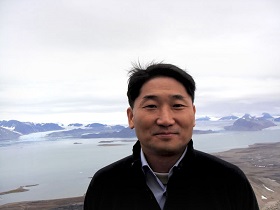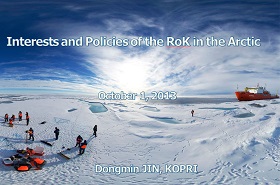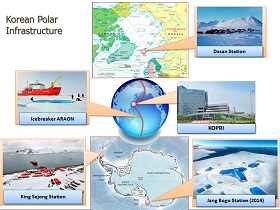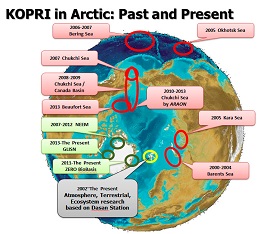Interest in the Arctic region is growing. The activity of the Arctic states is accompanied by initiatives from non-Arctic countries. The traditional actors in the region are concerned about the future plans of new observers in the Arctic Council, especially those from the Asia-Pacific. Representatives of the latter are warmly welcomed at international forums on Arctic issues. The strategies of their countries have yet to be presented. An interview on the South Korea’s Arctic policy was given by Dong-min Jin, Head of the Polar Logistics Division, KOPRI.
Interest in the Arctic region is growing. The activity of the Arctic states is accompanied by initiatives from non-Arctic countries. The traditional actors in the region are concerned about the future plans of new observers in the Arctic Council, especially those from the Asia-Pacific. Representatives of the latter (i.e. China, South Korea, Japan, India and Singapore) are warmly welcomed at international forums and conferences on Arctic issues. The strategies of their countries have yet to be presented.
An interview on the South Korea’s Arctic policy was given by Dong-min Jin, Head of the Polar Logistics Division, Korea Polar Research Institute (KOPRI).
The Republic of Korea has recently become an observer in the Arctic Council. In your opinion, why is it so important for South Korea to be involved in Arctic affairs? What are its national interests in this region?
One reason is national pride and national privilege in global society. As you know, fifty years ago Korea was one of the poorest countries in the world. Having gained economic prosperity, the Korean people want their government to take a more active part in international relations. Mr. Ban Ki-Moon, the UN Secretary-General, has criticized the Korean government for not allocating enough resources to foreign policy. He stressed South Korea's role in the wider world.
The Korean people view Polar activities as a kind of international cooperation. That is one of the reasons for Korean activity in the region. The second reason involves opportunities for business. Our companies pay special attention to ocean affairs. Korea’s long-term interests are closely related to shipping, ship-building, offshore engineering and fishing. Recent changes in the Arctic have strengthened our potential in these areas.
In your presentation you’ve mentioned some documents that South Korea has on the governmental level. Can we speak of a written strategy of the Republic of Korea in the Arctic, or is this a matter for the near future?
This July, the Korean government announced its intention to formulate a detailed action plan – the Integrated Arctic Policy. I think you can call that plan a written document. The Korean Arctic policy is based on a number of documents (see slide 9 of the presentation). We see the priorities for Korean activity in the Arctic as follows:
- strengthening cooperative relations with Arctic countries;
- expanding Arctic research activities;
- developing a new Arctic business model;
- improving legal and institutional infrastructure.
There are seven ministries involved in Arctic affairs. These are the Ministry of Foreign Affairs, the Ministry of Science and Future Planning, the Ministry of Trade, Industry and Energy, the Ministry of Environment, the Ministry of Land, Infrastructure and Transport, the Ministry of Oceans and Fisheries, and the Korea Meteorological Administration.
We know that South Korea is very famous for its vessel construction. What is its potential for the construction of icebreakers? Do you have any tenders for construction of such vessels? If so, which countries and companies are interested?
Yes, that’s right. Our own research vessel was designed in Korea by a Korean company, and constructed in Korea. In addition, the Samsung company has delivered an ice-strengthened tanker to a Russian company. So in the future, I think, this Korean company will be interested in constructing new types of icebreakers or ice-strengthened vessels for the Arctic areas. This is why representatives of Korean shipbuilding are eager to participate in Polar discussions.
Furthermore, as a national operator we have started providing reports for the government to build a second ice-breaking research vessel. If the government decides to build that kind of vessel, this will also benefit Korean shipbuilding companies.
What projects in the Russian Arctic zone might be interesting to Korea?
This year, our icebreaker conducted marine research work within the EEZ in Canada. It’s a kind of geological survey. I think if Russian scientists agreed, this kind of work could be done in Russian waters. In particular, the last slide of my presentation is geoscientific research recently published as a result of the last year’s cruise in the Arctic. Korean and German scientists found some proof of the ancient glacial ages in the Arctic Sea. Also, some years ago my Russian colleagues and I discussed the possibility of joint research on gas fields in Russian waters. There is a lot of work that can be done jointly with our Russian colleagues.
You have mentioned a lot of joint work going on between scientists. What are your partners in scientific research in the Arctic?
Let me start with Asian countries. Our partners are NIPR, the National Institute of Polar Research in Japan, and the Polar Research Institute of China, PRIC, based in Shanghai. In addition, if I go to Europe, there are the Norwegian Polar Institute and the Alfred Wegener Institute, AWI, in Germany, the British Antarctic Survey in the UK, and the Institute of Paul Émile Victor, IPEV, in France. In Russia it’s AARI, the Arctic and Antarctic Research Institute in Saint-Petersburg, and also the Shirshov Oceanographic Institute.
Can we speak of an Arctic research network or are these bilateral connections?
The research institute is based on bilateral ties, but there are also multilateral forums on the Arctic and Antarctica, like common meetings. In the case of Antarctica, it's the Council of Managers of National Antarctic Programs. They meet every year and exchange information and discuss joint projects.
And what can you say about the Arctic?
In the Arctic it is ASSW, the Arctic Science Summit Week, a meeting which was held in Seoul in 2011. International organizations like the International Arctic Research Committee and FARO, the Forum of Arctic Research Operators, as well as PAG groups, meet together and exchange selected results and also discuss future plans. We take part in these meetings as an institution.
Thank you for your answers.
Interviewer: Timur Makhmutov, RIAC Deputy Program Director







